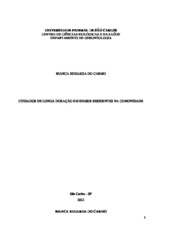Cuidados de longa duração em idosos residentes na comunidade
Abstract
With increasing longevity, people with chronic illnesses and frailty who require support and care in old age are increasing. New forms and demands for long-term care are emerging, whether at home or in long-term care facilities. Caring for the elderly at home is a situation that must be preserved and encouraged by health organizations, and must have interaction with public policies. This study aimed to: analyze factors that led caregivers and families to seek long-term care for elderly people registered on waiting lists of long-stay institutions in a city in the interior of São Paulo. This is an observational, cross-sectional, exploratory study using the quantitative-qualitative method of investigation with the participation of caregivers of elderly people. Data collection was carried out through telephone interviews, respecting the guidelines of the World Health Organization in favor of the current pandemic scenario. The instruments applied were a semi-structured interview about the elderly person's health conditions, care, social support, family arrangement and burden and stress scale for the caregiver. For the analysis of quantitative data, descriptive and inferential statistical analysis was used, and for qualitative data, content analysis was used. In the present study, it was found that the caregiver's “tension” (p = < 0.024) and “time of care” (p = < 0.000) interfere in this process of searching for LSIE to take care of the elderly person. Qualitative data indicate that informal elderly caregivers have major impacts and challenges during the process of long-term care at home, since socioeconomic, health and social conditions directly interfere in the quality of life of the elderly and their caregivers.
Collections
The following license files are associated with this item:

